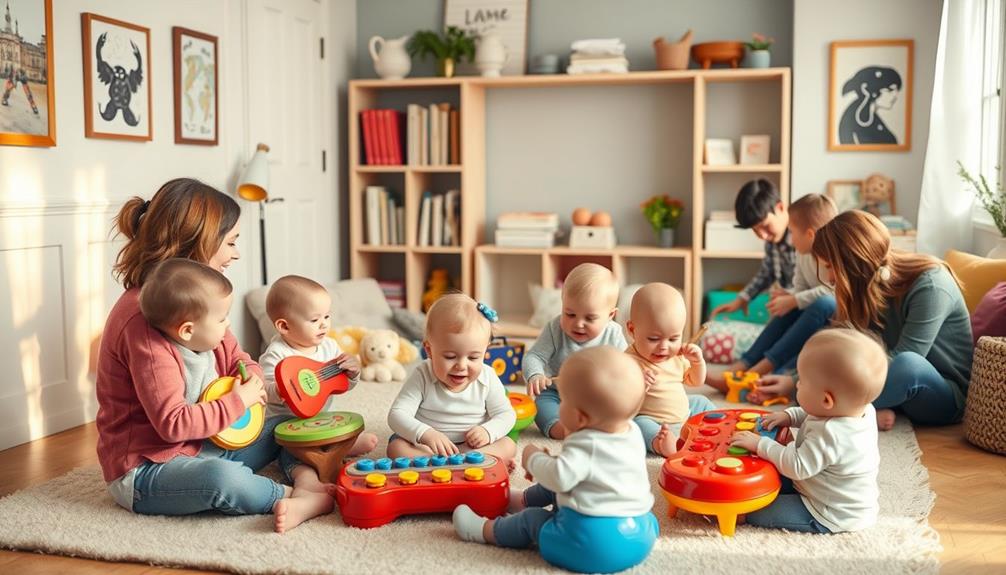The idea that classical music, like Mozart, makes babies smarter is mostly a myth. While a 1993 study showed a temporary boost in spatial IQ among college students after listening to Mozart, these claims were greatly exaggerated. There's little evidence to support long-term intelligence enhancement in infants. However, engaging kids in music—whether through singing, dancing, or playing instruments—can help improve language skills, emotional regulation, and social interactions. So while classical music isn't a magic intelligence booster, it does have its benefits. To discover more about music's impact on development, you may want to explore further.
Key Takeaways
- The Mozart Effect suggests a temporary increase in spatial IQ after listening to Mozart, but this boost lasts only 10-15 minutes.
- Scientific studies show no substantial evidence that classical music enhances general intelligence in infants or children.
- Engaging in music, regardless of genre, promotes cognitive growth more effectively than solely listening to classical music.
- Music can enhance emotional bonding, reduce stress in infants, and improve language skills through rhythmic patterns and singing.
- Group music activities foster social skills, cooperation, and communication among infants, contributing to their overall development.
Origin of the Mozart Effect
What sparked the fascination with the Mozart Effect? It all began with Frances Rauscher's 1993 study published in *Nature*. In this groundbreaking research, she'd 36 college students listen to Mozart's sonata for just 10 minutes before tackling spatial reasoning tasks. The results were intriguing: participants showed an 8-9 point increase in spatial IQ immediately after hearing the classical music.
This phenomenon has drawn parallels to the insights from ancient wisdom and philosophical teachings, which emphasize the importance of sound and harmony in enhancing cognitive abilities. However, this boost in cognitive abilities was temporary, lasting only 10-15 minutes.
Despite the study's focus on college students, media coverage exaggerated the results, suggesting that classical music could enhance general intelligence in infants. This misinterpretation led to a widespread belief in the Mozart Effect's potential benefits for babies, prompting state governments to distribute classical music CDs to new parents.
Critics soon pointed out that jumping from a temporary improvement in spatial reasoning to claims of enhanced general intelligence was unfounded. Subsequent research failed to support these claims, leaving you to question the validity of the Mozart Effect as a tool for boosting cognitive skills in children.
Media Influence on Public Perception

You might be surprised at how media misrepresentation has shaped public perception of the Mozart Effect.
Initially, enthusiastic coverage led to widespread misconceptions about the cognitive benefits of classical music for infants. This phenomenon reflects a broader trend where ethical considerations in educational data mining can influence public understanding.
As the hype faded, many still cling to these inaccurate beliefs, illustrating the lasting impact of misleading information.
Media Misrepresentation Effects
Media misrepresentation can greatly distort public perception, especially when it comes to scientific claims like the Mozart Effect. Initially, the media reported on a limited study involving college students, transforming it into a widespread belief that classical music boosts child intelligence. This misinterpretation fueled misconceptions about the cognitive benefits of music, leading to the promotion of public policies that lacked empirical support, such as Georgia's governor distributing classical music CDs to newborns in 1998.
The 1997 book "The Mozart Effect" by Don Campbell further amplified these exaggerated claims, despite insufficient scientific literature backing them. A 2004 Stanford study revealed that Frances Rauscher's original paper received 8.3 times more citations than the next popular study, highlighting how disproportionate media attention can shape public beliefs.
Journalists initially embraced the Mozart Effect enthusiastically but later shifted to skepticism and ridicule, demonstrating the irony of how the media can craft and then dismantle scientific narratives. Ultimately, these misrepresentations considerably influence public perception, leading many to believe in an idea that lacks solid empirical support.
Public Misconceptions Persist
Despite evolving scientific understanding, public misconceptions about the Mozart Effect persist, largely fueled by initial media portrayals. The media's early coverage overwhelmingly focused on a 1993 study involving college students, creating a narrative that linked listening to classical music with enhanced intelligence. This misconception snowballed, especially when Georgia's governor promoted classical music CDs for new mothers, mistakenly using Beethoven's *Ode to Joy* in his advocacy.
You might be surprised to learn that, while Rauscher's original findings indicated some benefits of classical music, there's no solid scientific backing for the claim that it boosts intelligence in infants. Misrepresentation of the study led many to believe that simply playing classical music would make their babies smarter.
By 2004, a Stanford study highlighted how Rauscher's paper was cited 8.3 times more than the next popular study, showcasing the overwhelming influence of media coverage on public perception.
The irony lies in how the media's shift from enthusiasm to skepticism regarding the Mozart Effect has turned exaggerated claims into ridicule, forcing a reassessment of previously accepted beliefs. It's essential to separate fact from fiction when discussing the impact of music on intelligence.
Scientific Critiques and Findings

The scientific community has raised significant critiques regarding the validity of the Mozart effect, particularly regarding its claims of enhancing intelligence through exposure to classical music. Original studies, like the 1993 research by Frances Rauscher, showed a temporary increase in spatial reasoning among college students, but this effect only lasted 10-15 minutes and didn't suggest any general intelligence enhancement.
A meta-analysis in 1999 reviewed 16 studies and found that improvements in spatial tasks were minor, averaging just 1.5 IQ points. By 2010, another extensive meta-analysis indicated that the purported Mozart effect lacked substantial support, reinforcing the idea that classical music doesn't provide long-term cognitive benefits.
By 2023, a German review concluded that the phenomenon is nonexistent, further challenging the claims of intelligence enhancement. Critics argue that flaws in task selection and methodologies in the original studies contribute to difficulties in replicating findings.
| Year | Study Type | Key Findings |
|---|---|---|
| 1993 | Original Study | Temporary spatial reasoning increase (8-9 IQ) |
| 1999 | Meta-Analysis | Minimal improvement (1.5 IQ points) |
| 2010 | Extensive | Largely unsupported claims of cognitive benefits |
| 2023 | Review | Declared the phenomenon nonexistent |
| N/A | Scientific Critique | Flaws in methodology undermine the Mozart effect |
Cognitive Development and Music

When it comes to cognitive development and music, you'll notice a gap between popular claims and scientific evidence.
While engaging with music can enhance brain activity and boost skills, the specific benefits of classical music aren't as strong as some might think.
In fact, the emergence of AI-generated music may also play a role in how children interact with sound and rhythm.
Instead, active participation in music, regardless of genre, shows more promise in fostering cognitive growth in young children.
Claims Vs. Evidence
Listening to classical music has often been touted as a magical key to unfastening cognitive potential, especially in infants and children.
The so-called "Mozart effect" suggests that listening to Mozart can temporarily boost spatial reasoning skills.
However, evidence shows this effect is fleeting; a 1993 study found an 8-9 point increase in spatial reasoning scores only lasting 10-15 minutes, with no link to overall intelligence.
A later meta-analysis in 1999 revealed only a modest 1.5 IQ point increase in specific tasks, like paper-folding.
Active Engagement Benefits
Engaging actively with music, whether through singing, dancing, or playing instruments, greatly boosts cognitive development in infants and young children. When you involve your child in music education, you're not just having fun; you're paving the way for academic success. Studies show that kids who participate in music programs often score higher on standardized tests and improve their reading abilities.
| Active Engagement | Cognitive Development | Benefits |
|---|---|---|
| Singing | Enhances language acquisition | Expands vocabulary |
| Dancing | Improves physical coordination | Boosts motor skills |
| Playing Instruments | Increases brain activity | Stimulates neural pathways |
| Rhythmic Activities | Fosters social interaction | Builds emotional bonds |
| Repetitive Songs | Aids auditory discrimination | Supports cognitive skills |
Through active engagement, your child not only experiences joy but also benefits from enhanced brain activity and diverse musical experiences. This interaction fosters social bonds, encouraging emotional growth and overall development. So, let your little one explore the world of music, and watch as their cognitive skills flourish!
Emotional Benefits of Classical Music

Classical music can work wonders for infants' emotional well-being, helping to ease their stress and anxiety. When you play soothing melodies, you promote relaxation and even improve their sleep patterns.
Research shows that early exposure to classical music fosters emotional bonding between you and your child, enhancing both your moods and overall well-being. Additionally, incorporating aromatherapy techniques alongside music can further enhance the calming environment for your baby.
Music therapy can effectively regulate emotions in young children, as the melodic sounds facilitate positive emotional responses. Engaging with rhythmic music encourages emotional expression in infants, aiding their ability to communicate feelings and connect with you as a caregiver.
When you sing or play classical music, you create a safe space for your baby to explore their emotions. This early exposure to classical music has also been linked to improved emotional regulation skills.
As your child learns to cope with stress and emotional challenges, they'll benefit from the calming influence of music. By incorporating classical music into your daily routine, you're not just enriching their lives; you're also nurturing their emotional development, ultimately leading to a happier, more well-adjusted child.
Music's Role in Language Skills

Music plays a pivotal role in developing language skills in infants, as it helps release their potential for communication. Engaging with classical music can greatly enhance various aspects of language development, including:
- Phonetic Awareness: The rhythmic patterns in music improve infants' ability to recognize sounds and syllables, laying the groundwork for effective speech. This phonetic development is further supported by the importance of play in enhancing cognitive growth.
- Vocabulary Expansion: Exposure to nursery rhymes and songs fosters an enriched vocabulary, encouraging infants to learn new words and their meanings.
- Expressive Language Skills: Participating in music activities, like singing, boosts infants' expressive language abilities, making it easier for them to articulate thoughts and feelings.
Additionally, early music education stimulates auditory discrimination, an essential skill for recognizing the nuances of speech. Research shows that infants who engage in musical activities demonstrate improved language skills compared to those who don't.
The rhythmic structure of music mirrors speech patterns, enhancing comprehension and communication. By incorporating classical music into your baby's routine, you're not just providing entertainment; you're actively nurturing their language skills and paving the way for their future literacy.
Social Skills Through Musical Engagement

Participating in musical activities not only boosts language development but also greatly enhances social skills in infants. When you engage your baby in group music activities, you're encouraging cooperative play and teamwork, which are crucial for social bonding with caregivers and peers.
Music facilitates communication, allowing infants to express themselves and recognize social cues, building their empathy and understanding of others. This shared experience can also help in healing after conflicts, fostering emotional resilience through support networks.
Shared musical experiences promote interaction with peers, helping your child develop essential social skills necessary for later life. Studies show that infants exposed to music engage more with others, enhancing their ability to form lasting connections and relationships.
By participating in musical games, your little one learns to navigate social interactions, fostering emotional intelligence and resilience.
Moreover, these shared musical moments create positive emotional memories. As your child enjoys music with others, they learn about cooperation and emotional expression.
This foundation not only enriches their social skills but also instills a sense of community and belonging. So, when you introduce music into your baby's routine, you're doing much more than entertaining them; you're laying the groundwork for strong social connections that will benefit them throughout their life.
Frequently Asked Questions
Does Classical Music Really Help Baby Brain Development?
When you wonder if classical music helps baby brain development, it's important to know that the effects aren't as clear-cut as you might hope.
While listening to music can stimulate brain activity and boost social interactions, it doesn't necessarily enhance intelligence.
Engaging with music through singing, clapping, or playing instruments is more beneficial. This active participation can improve motor skills and emotional regulation, fostering a richer developmental environment for your baby.
Does the Mozart Effect Really Work?
You might wonder if the Mozart effect truly works.
While early studies suggested a temporary boost in spatial reasoning, later research largely disproved those claims. Most findings show minimal impact on IQ from listening to classical music, and the supposed benefits often stem from media exaggeration.
Although music can enhance emotional and social development, it doesn't guarantee an increase in intelligence.
Can Listening to Classical Music Really Boost Intelligence?
Did you know that listening to Mozart can temporarily boost spatial reasoning skills by about 8-9 IQ points, even if just for 10-15 minutes?
While it sounds intriguing, research shows that the long-term impact of classical music on intelligence isn't significant.
You might find that music enhances your mood or social skills instead, but it won't guarantee a higher IQ.
What Is the Effect of Classical Music on Unborn Babies?
When you play classical music during pregnancy, your unborn baby can hear those sounds, but the effects aren't as clear-cut as you might hope.
While some studies show that music exposure can lead to increased fetal movement and heart rate variability, it doesn't prove that it boosts intelligence.
You might enjoy the experience and bond with your baby, but remember, there's no solid evidence that classical music makes them smarter.
Conclusion
To sum up, while the Mozart Effect sparked interest in the link between classical music and intelligence, its real impact might be more nuanced. Studies show that children who engage with music can score up to 40% higher on spatial-temporal reasoning tests, indicating that music's benefits extend beyond just making babies smarter. So, consider playing some classical tunes not just for your little one's brainpower, but also for their emotional and social development. It's a win-win!










